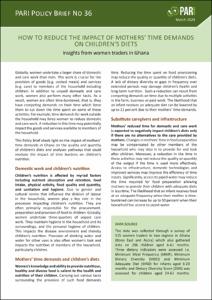Saleemi, Sundus; Bubune Letsa, Crystal; Owusu-Authur, Johnny; Mohammed, Abubakri; Baah-Tuahene, Sylvia; Yeboah, Marilyn; Omari, Rose: How to reduce the impact of mothers’ time demands on children’s diets : Insights from women traders in Ghana. Bonn: Center for Development Research (ZEF), 2024. In: PARI Policy Brief, 36.
Online-Ausgabe in bonndoc: https://doi.org/10.48565/bonndoc-265
Online-Ausgabe in bonndoc: https://doi.org/10.48565/bonndoc-265
@techreport{handle:20.500.11811/11493,
doi: https://doi.org/10.48565/bonndoc-265,
author = {{Sundus Saleemi} and {Crystal Bubune Letsa} and {Johnny Owusu-Authur} and {Abubakri Mohammed} and {Sylvia Baah-Tuahene} and {Marilyn Yeboah} and {Rose Omari}},
title = {How to reduce the impact of mothers’ time demands on children’s diets : Insights from women traders in Ghana},
publisher = {Center for Development Research (ZEF)},
year = 2024,
month = mar,
series = {PARI Policy Brief},
volume = 36,
note = {Globally, women undertake a larger share of domestic and care work than men. This work is crucial for the provision of goods (e.g. cooked meals) and services (e.g. care) to members of the household including children. In addition to unpaid domestic and care work, women also perform many other tasks. As a result, women are often time-burdened, that is, they have competing demands on their time which force them to cut down the time spent on some of these activities. For example, time demands for work outside the household may force women to reduce domestic and care work. A reduction in this time may potentially impact the goods and services available to members of the household. This Policy Brief sheds light on the impact of mothers’ time demands in Ghana on the quality and quantity of children’s diets and analyses pathways that could mediate the impact of time burdens on children’s nutrition.},
url = {https://hdl.handle.net/20.500.11811/11493}
}
doi: https://doi.org/10.48565/bonndoc-265,
author = {{Sundus Saleemi} and {Crystal Bubune Letsa} and {Johnny Owusu-Authur} and {Abubakri Mohammed} and {Sylvia Baah-Tuahene} and {Marilyn Yeboah} and {Rose Omari}},
title = {How to reduce the impact of mothers’ time demands on children’s diets : Insights from women traders in Ghana},
publisher = {Center for Development Research (ZEF)},
year = 2024,
month = mar,
series = {PARI Policy Brief},
volume = 36,
note = {Globally, women undertake a larger share of domestic and care work than men. This work is crucial for the provision of goods (e.g. cooked meals) and services (e.g. care) to members of the household including children. In addition to unpaid domestic and care work, women also perform many other tasks. As a result, women are often time-burdened, that is, they have competing demands on their time which force them to cut down the time spent on some of these activities. For example, time demands for work outside the household may force women to reduce domestic and care work. A reduction in this time may potentially impact the goods and services available to members of the household. This Policy Brief sheds light on the impact of mothers’ time demands in Ghana on the quality and quantity of children’s diets and analyses pathways that could mediate the impact of time burdens on children’s nutrition.},
url = {https://hdl.handle.net/20.500.11811/11493}
}






